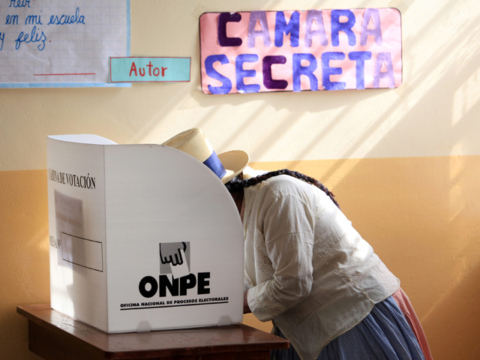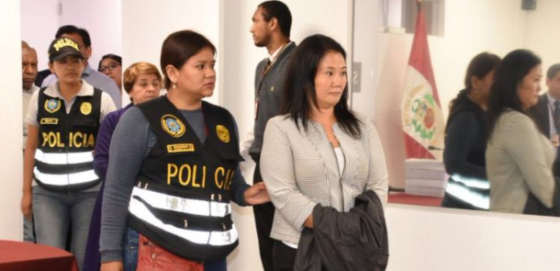Peru’s Election and Beyond: What’s Next?
Peruvians want an evolution, not a revolution.
On February 18th, 2016 the Inter-American Dialogue hosted a discussion on the upcoming Peruvian elections. Alfredo Torres, CEO of Ipsos Perú, delivered a presentation on Ipsos’s findings regarding the race and the presidential candidates. Alberto Vergara, a Harvard professor and widely-known analyst of politics and economics in Perú, and José Gonzáles, expert on finance, economic and political affairs, joined Mr. Torres in the conversation on the possible outcomes of the elections. The discussion was moderated by Michael Shifter, President of the Inter-American Dialogue.
The presentation by Torres gave attendees contextual information about the elections. Torres discussed voter concentration in Lima, the effects of having a young electorate and the influence of pressing national issues like security, corruption, and the economy in voting. At the end of his presentation, other influential factors were discussed—such as the socio-economic level of voters, preference for middle-aged and center candidates as well as underdogs, and a demand for change.
In terms of voting intentions, Torres recognized that Keiko Fujimori has maintained a strong lead throughout the race. The former congresswoman and daughter of former President Alberto Fujimori (1990-2000) has consistently polled over 30% in recent months, which Torres attributed to the remaining support for fujimorismo and the idea that since her father was tough on terrorism, “she will do the same against delinquency”. However, Torres added that this association also affects her candidacy negatively because of the link between corruption and her father’s government.
Torres noted that Julio Guzmán, a technocrat, has surprisingly become a strong contender following his recent spike from 5% to 16% in the polls. However, according to Torres, Guzmán is in “a coma” due to alleged irregularities during his party’s primaries, which may lead to his disqualification from the race. Guzmán is not associated with traditional parties which allowed him to win support not only in Lima and other big cities but also more recently in the popular sector. Torres described the image of Pedro Pablo Kuczynski (PPK) as one of an internationally-experienced technocrat, which makes him popular among the middle and upper-middle classes. Yet his age and public perception of him as “candidate of the rich” spoil his chances with voters outside of Lima. Torres added that Alan Garcia was similarly supported because he is an “experienced leader” but association to a traditional political party offset the benefits of this image. César Acuña’s image of a “successful business that emerged from below” has helped him win support outside of Lima but recent allegations of plagiarism and other accusations have put a strain in his campaign.
Torres concluded his presentation with a few predictions for the elections including that the April 10 vote will lead to a run-off election in June that Keiko Fujimori will most likely win. Torres also noted that if Guzmán is left out of the race, there will be “pressure to oust Acuña”, seen by the political class as “morally disqualified to govern”. Peruvians would also look for a new outsider, possibly benefiting candidates like Verónika Mendoza or Alfredo Barnechea.
[caption id="attachment_47204" align="alignleft" width="401"]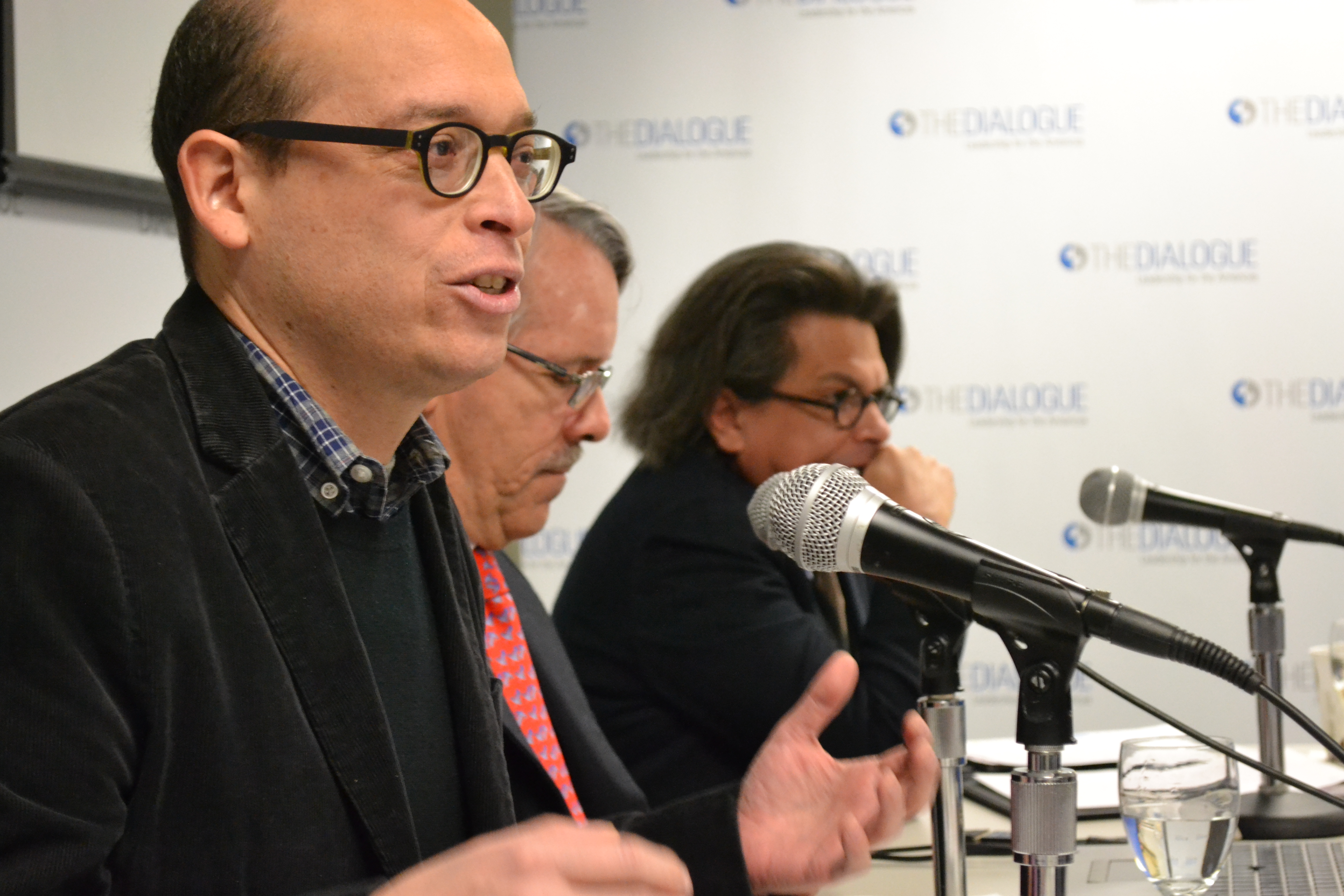 Alberto Vergara - Photo by Ben Raderstorf / Inter-American Dialogue[/caption]
Alberto Vergara - Photo by Ben Raderstorf / Inter-American Dialogue[/caption]
Vergara also sought to contextualize the elections. To Vergara, the last 15 years have been characterized by “a booming economy, institutional weakness, and political bankruptcy.” While poverty and inequality have been reduced, citizens do not enjoy “democratic satisfaction.” Vergara insisted that there is no trust in the political system due to a notable institutional decay, adding that Peru’s weak political class has been a major contributor to this mistrust and lack of strong leadership. These elections are particularly important, according to Vergara, since the public is now aware of the how economic success did not bring institutional strength and change. Well-trained technocrats have been in charge of the economy yet there has not been the same type of development regarding politics. Vergara summarized this problem by stating that “Peru is well-managed, not well governed.” He concluded by arguing that the bigger question in the elections is whether this election will change the “trend of institutional weakness and political will.” Vergara is not hopeful since in his regard the presidential candidates share the “political weakness” that Peru has seen recently.
Gonzáles, from ECG Management, emphasized the cynicism of voters in Peru. Gonzáles agreed with Vergara’s take on Peru’s strong economic growth and added humorously throughout the discussion that the 21st century “is about the politics, stupid.” To Gonzáles, the Peruvian economy is particularly well-managed, leading it to possibly becoming the strongest in the region. With poverty decreasing, the “marginal but real” creation of formal employment and high solvency, the outlook for the Peruvian economy is relatively positive even with the current global economic landscape. According to Gonzáles, “we are living a very tumultuous era globally, and Peru is living part of that. I believe we are going through a massive emancipation. Emancipation is defined as freedom of choice and equality of opportunity. Most of the emancipation is coming from technology.” Gonzáles added that there is an increase in integration because of technology and access to information yet Peruvians have an instinctive mistrust in the political class and the market economy. He attributed public frustration to unmet expectations of development and pointed to the current administration’s “lack of empathy” and failure to connect with the majority of Peruvians. Gonzáles concluded by stating that Peruvians ultimately want economic equity and equality under the law, which he believes are keys to a stronger political system.
[caption id="attachment_47207" align="alignright" width="438"]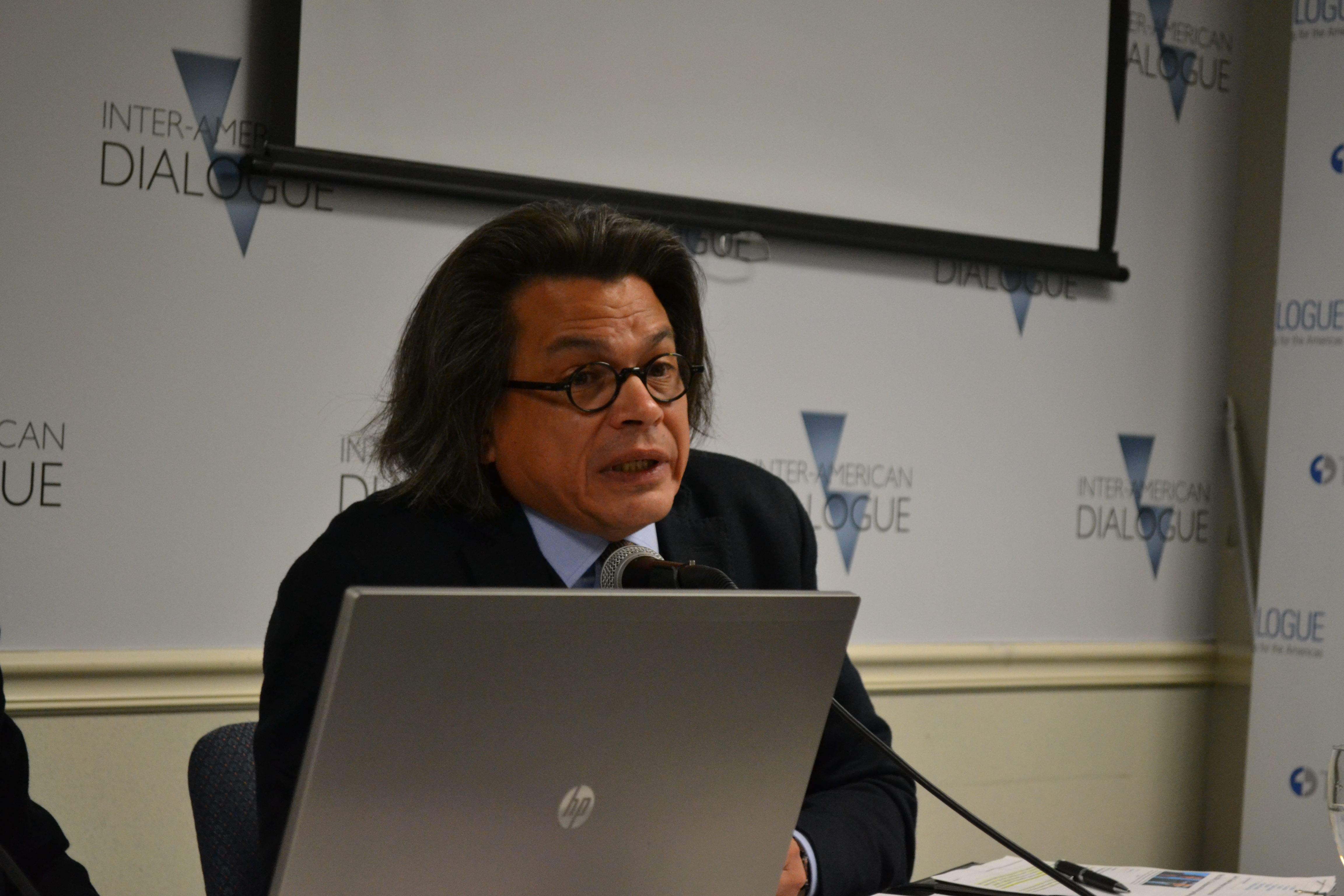 José Gonzáles - Photo by Ben Raderstorf / Inter-American Dialogue[/caption]
José Gonzáles - Photo by Ben Raderstorf / Inter-American Dialogue[/caption]
During the round of questions, some wondered which lessons the next president could learn from the Humala administration. Panelists noted that the weaknesses of President Humala’s leadership are the most important to evaluate. Gonzáles argued that Humala deepened Peruvian skepticism of the government. He added that the next president should prioritize the vote, the creation of institutions, and “deal with politics.” Torres further explained that the next president should look to regain the strength of economic growth since it is a “condition needed” to improve areas like education, security and most importantly, technocracy and civil service.
Questions also arose regarding who the business sector favors and to which candidate average Peruvians can relate the most. Panelists agreed that PPK, García, and Fujimori are the favorites among the business sector, unlike Acuña and Guzmán. Incidentally, Acuña and Guzmán, as well as Fujimori, were believed to be favored among those who want a candidate that they can relate to.
As concluding remarks by the moderator and the panelists, the uniqueness of the “Peruvian paradox” was mentioned along with the constant change in the polls, demonstrating the relative uncertainty of the final results.
Peruvians want an evolution, not a revolution.
Everything you need to know about Peru’s presidential elections.
What does the arrest of Peruvian opposition leader Keiko Fujimori mean for the country’s politics?
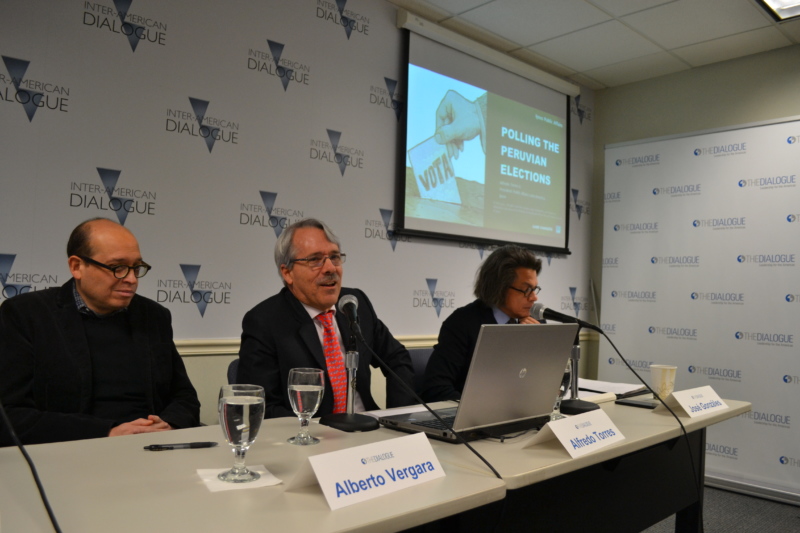 Ben Raderstorf / Inter-American Dialogue
Ben Raderstorf / Inter-American Dialogue
